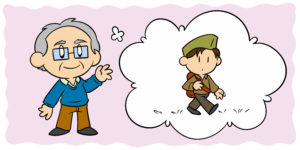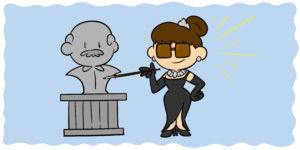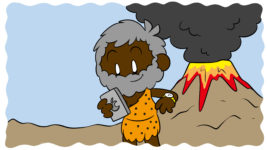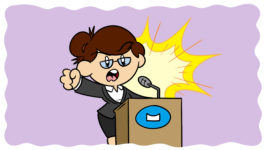Alternate history fiction is one of the hidden gems of literature, a sprawling chasm of a genre often overlooked by those not familiar with it. This is perhaps because on the surface it can look like fantasy or science-fiction – involved as it is with stories of worlds not our own – however beneath the surface it’s an entirely different thing.
This is because alternate history fiction is concerned with stories stemming from real life. An AH story begins with a single fact that differentiates the world of the story from our own, and goes on to detail the events that might have occurred if this fact was true. The classic example is ‘what if the Nazis had won World War II’.
AH mixes elements of sci-fi, fantasy and even historical fiction in a way that’s incredibly engaging and hugely satisfying. Plots lend themselves to intricacy and come pre-packaged with a wealth of reference material and ideas. Readers who would never watch a History Channel documentary or pick up a historical thriller can lose themselves in AH writing.
That’s why I’ll be looking at three key rules that can help authors write genuinely gripping AH stories. As ever, the ‘rules’ are just guidelines for authors, intended to offer a deconstruction of why a genre works. With that understood, the first totally unbreakable rule is…
#1 – Choose one event
The example I gave before, ‘what if the Nazis had won the war?’, is useful for illustrating the basic idea of alternate history fiction, but fails to convey the real charm of the genre.
This charm comes from the research and diligence alternate history authors apply to their work. Unlike sci-fi and fiction writers, the AH writer is not endeavoring to create a new world, but to imagine our own under different circumstances. While a Nazi WWII victory offers a tempting hypothetical, alternate history fiction tends to focus on more specific moments and build to a crescendo of difference that tells a great story while exploring our own history.
In Making History, for example, Stephen Fry posits not ‘what if the Nazis had won?’ but ‘what if Hitler had never been born?’ The first is a huge question, begging a myriad of answers all at the same time. In contrast, the removal of a single man, while maintaining all the political tensions and world history that led up to the war, allows Fry to tell a great story while simultaneously exploring the real significance of history’s most hated villain. The consequences branch off, and the reader is able to follow the logic of the question to its many surprising conclusions.
In Fry’s alternate world, Hitler’s absence makes way for an equally ruthless but more effective zealot named Rudolf Gloder. Gloder is slower to go to war, winning a mandate in the Reichstag in 1932 and going on to build Germany’s electronics industry. After achieving peaceful unification with Austria in 1937, Gloder’s Nazi party use their economic prosperity to develop a nuclear weapon, destroying Moscow and Leningrad. The Soviet Union, Turkey and Hungary are quickly invaded, and the historical alliance which defeated the Nazis is formed too late – and with too few members – to prevent a fascist victory.
The story is told from the point of view of a young American who, after using a device in his present to sterilize Hitler’s father, wakes up in the new world of a socially conservative USA which never saw such events as the social awakening of the sixties or the decriminalization of homosexuality.
Branded a subversive due to his fanciful talk of the world before, the young American finds a way to negate the sterilization of Hitler’s father and bring his own world back – happily including the memories of his now-legal boyfriend from the alternate timeline.
It’s important to note that the book is set nearly entirely in the ‘present’ of both our own world and the fictional alternate. The reader learns about the alternate history mainly through the protagonist’s own research and conversations.
This approach is fairly typical of AH, where the fastidiously researched historical details fit around a more philosophical conceptualization of the differences between the real world and the alternate. Fry is really asking a myriad of questions; ‘what were Hitler’s failings as a leader?’, ‘what would it have taken for the Nazis to win?’, ‘what would Nazi society look like decades into peace-time?’, all explored through a single, central event.
The more general ‘what if the Nazis won the war’ is a far wider reaching question, and allows the reader to get ahead of the author by drawing their own conclusions. In contrast, Hitler’s absence does not draw a clear path to any kind of future. Fry answers his death with the presence of Gloder, a character who acts as a critique of the leader but also has his own aims and temperament.
This is important since there is no real answer to the questions asked, and AH fiction needs to appreciate this and negotiate the obstacles it creates. History is incredibly complex, past the abilities of any one person to unravel or predict, and so the smart AH writer will base their story on a conceit only they can answer.
Specific events support this practice, since they can be altered in ways that lead to the author’s desired outcome. A battle might be lost, but it’s down to the author how badly it is lost. Consider the same battle lost in three ways:
- Army A sees that army B is too big to defeat and surrenders. Army B takes them prisoner, and gains their resources.
- Army A is routed, and no resources can be saved.
- Army A loses the battle through strategic retreat, saving the majority of their resources for another day.
Just from this example, it’s easy to see how authors can put themselves in a position to tell whatever story they want. This is what makes books like Making History and Robert Sobels’ For Want of a Nail: If Burgoyne had won at Saratoga work so well; they are in essence magic tricks where the reader is fooled into concentrating on the places where the author wants their attention.
This is the single most important thing the AH writer can do in their writing, since it gives them so much power to imbue their own interpretation of events with authority, but it’s useless without another vital step…
#2 – Appreciate the foreknowledge of your reader
The Nazis are a perpetual presence in AH fiction because they are so widely known. Their historical acts and philosophical ideals are assumed knowledge for members of the Western world. Because of this, the AH author who wishes to experiment with WWII timelines can be relatively assured that their audience possesses enough knowledge to appreciate any changes. In the case of Making History, for example, the reader is assumed to know that Hitler was the actual leader of the Nazi party, and that the Nazis lost WWII.
There are other historical events that share this notoriety; the American Civil War and the Cold War are similar stalwarts of the AH genre, but apart from these major events AH authors have a difficult decision to make.
On the one hand they can dedicate themselves to informing their reader. This can be a difficult task, since it means the author has to communicate two timelines – the real one and the fictional alternate – while contrasting the two with some degree of subtlety. Making History does this with a meeting at which Hitler spoke, contrasting his own performance against the fictional Gloder’s to show the differences in their approach. Fry deftly uses this to characterise the Nazi parties that result, and in combination with the well-known subject matter this means he doesn’t have to provide much more information on the ‘real’ timeline.
The other option is to write for an audience with an existing understanding of the events you wish to explore. The drawback to this approach is that you’re targeting a much smaller readership, but the bonus is that it’s a readership with a feverish interest in the subject matter. A real WWII buff would likely view Fry’s work as mere entertainment, whereas stories like Jack Tindale’s The Limpid Stream and Tom Black’s For Want of a Paragraph appear as well-researched, insightful deconstructions of real events even to those obsessed with British politics.
As ever, there’s no right answer, but it’s worth keeping in mind that there is a huge AH readership which tends to be well-informed on historical and political events – counting on their expertise is a safer bet than you might assume.
Alternate History fiction has a huge readership which tends to be very well-informed.Click To TweetWhichever way you choose to go, the important thing is to have an accurate idea of what your readership already knows. Those happy to recap real history should avoid telling their readers what they already understand, while those counting on their readers to know facts in advance must be sure that their stories don’t hinge on something the reader turns out to know nothing about. It’s a risky tightrope to walk, and success is dependent on researching your intended audience and being good at conveying information simply.
Andy Cooke’s The Fourth Lectern is a good example of this, dealing with much of the salient real history in its blurb:
What if UKIP were given a lectern in the debates in 2010?
They weren’t, of course. Not in our world. But in a world very similar to our own, where the tiniest of changes happened, they were. And things turned out rather differently.
Ahead of the United Kingdom’s General Election in 2015, the populist right-wing, Eurosceptic United Kingdom Independence Party (commonly known as UKIP) was big news. What if their surge had happened earlier, in the dying days of a Labour Government?
What if the BBC, in attempting to close down arguments over whether the SNP and Plaid Cymru should be in the debates without excluding the Liberal Democrats, accidentally opened the door to UKIP?
Andy Cooke’s counterfactual of a four-way election depicts a world eerily similar to our own.
– Andy Cooke, The Fourth Lectern
Of course no matter how succinct the summary, great AH depends on the reader’s ability to compare real history against alternate history. Because of this, the decision between informing the reader or targeting the already informed will always have to be made.
#3 – No weak links
AH fiction is judged on two criteria. The first is how believable the reader finds the story in comparison to real life – could it, as suggested, actually have happened? The second is how believably the events of the story lead into each other.
For example, Fry’s Making History is not particularly believable in terms of the first measure. It depends on a sci-fi machine used to sterilize Hitler’s father and a fictional character created whole cloth by the author. It is, however, very believable by the second measure. The quote earlier describes in detail how one event progresses into another to result in the ‘present’ of the story.
There’s little you can do to affect the first measure except research copiously and justify your thesis. The second, however, is entirely down to the author.
There is no excuse for a weak link in the historical events of Alternative History.Click To TweetThere is, bluntly put, no excuse for a weak link in the historical events of AH fiction. The first time the reader questions whether one fictional event would prompt another, their enjoyment will plummet. This is completely avoidable – the events are fictitious, and the author can present them in whatever way they like.
What many authors forget – especially those working in a genre which is so exacting in its details – is that they have a great deal of control over what the reader can see. If one connection does not work then another can be adopted, and that connection can be presented in many different ways.
This domino effect, one fictional event prompting another of greater consequence, is the treasure at the heart of the AH genre. When done well it’s a marvel, and readers will feel as if a truly alternate history has been laid out before them. When done badly it’s a tragedy, and the reader will compare fictional history to the real thing and find the former badly wanting.
I touched earlier on the author’s ability to ‘stack the deck’ by starting with a seemingly minor detail. This is where the author can plant anything they’ll need to justify any later ‘jumps’ in logic. For Fry, Gloder is a tool – the only totally fictional element of his story, and one which allows him to steer the story towards situations which couldn’t be reached by political or historical insight alone.
AH authors should be on constant lookout for ‘leaps of logic’ – the legitimacy of the alternate world depends on each fictional event prompting the next.
Is there a future in writing alternate history fiction?
I said earlier that alternate history fiction is a more popular genre than some might realize, and that isn’t going to change anytime soon. There’s always more history being made, and the popularization of the video game has led to a surprising upsurge in interactive AH fiction, as players delve into the major conflicts of history and demand the ability to shape the outcome by their actions.
That means the genre will continue to evolve, and it also guarantees AH authors a young and well-informed reader base for the foreseeable future. As difficult as the research and crafting of an AH story may be, it’s a genre with a lot of rewards for those prepared to grapple with its complexities.
If you’re interested in a particularly subtle use of AH writing in popular fiction, I’d suggest this article on the brilliant hidden alternate history of pretty much every Quentin Tarantino movie. And for those looking to employ even more realism in their writing, why not check out Should authors use familiar places as story settings? by some insightful genius whose name escapes me.
Click here to see some more Alternate History Books.
Are you an alternate history aficionado or do you hate it with a passion? Let me know in the comments.
Alternate History Fiction: 3 Useful Rules You Should KnowClick To Tweet





6 thoughts on “Alternate History Fiction: 3 Useful Rules You Should Know”
Excellent presentation. Reminds me of how Star Trek Voyager did this trick with the Horogin being the NAZI’s. Very entertaining.
Hi Jim,
Thanks very much. I’m not familiar with that plot line, but it sounds like a good example.
Best,
Rob
I love alternate history and always try to imagine some alternative situation that feels better. Thank you for this article.
My pleasure, Mohi, thanks for the kind words.
– Rob
Is there a general word/page count for alternate history? I am not seeing anything in my searches so far? I am talking about those who aren’t big names in alternate history as they tend to get larger word/page counts than those starting out or early in their career.
Hi Robert,
Alternate history fiction is treated as speculative fiction, which is also often referred to as sci-fi, so those are the page counts to look for. I’ve linked to our own guide on book length below:
How Long Should Your Book Be? The Complete Guide
Best,
Rob